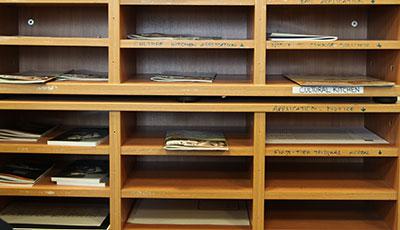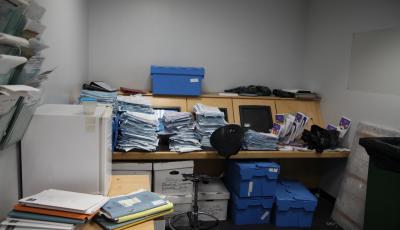Post by Mary Bosworth, Director of Border Criminologies. In this post, Mary draws on ongoing work in British IRCs to map out some initial thoughts on the nature of paper work and administrative power in detention. While criminologists and legal scholars frequently mention the administrative nature of detention in comparison to the punitive nature of prison, for example, they have not spent much time articulating quite what that administrative power looks like. This post is an attempt to do just that and forms the basis of an academic article that is underway.
Last summer I spent quite a lot of time in Harmondsworth and Colnbrook Immigration Removal Centres (IRCs), two detention facilities located side-by-side near Heathrow airport in London, observing, interviewing, and chatting to staff. While I’ve always included staff in my research, this one focuses almost entirely on them. Together with a DPhil student, Dominic Aitken, I’ve been trying to understand staff perspectives about their role and responsibilities in these adjacent institutions.
There are a number of reasons for the new focus. I thought it might be rather less emotionally draining to study staff (and it was). I also thought that a comparison between these adjacent sites, which have previously been run by different companies but have recently been amalgamated under one might illuminate ‘staff culture’ (and it did, sort of). I also thought it was right to give some concentrated time to staff, since other than Alexandra Hall’s work, we have so little on their perspectives. What do they do? How do they do it? Why do they do it?

Quite early in the project, Dominic and I began to focus on one particular aspect of staff, namely their administrative power. While considerable critical attention has been paid to the punitive nature of the experience of detention, we all know that these are administrative settings. What we know rather less about is what administrative power looks like and feels like to exercise. Do detention custody officers feel like prison officers, or do they perceive their work in other terms?
Much of the work that most DCOs do is a little boring. Those on the housing units spend a lot of time sending faxes, handing out personal care items (e.g., tweezers, razors, toilet rolls), trying to find detainees who have been called to a legal appointment or social visit, managing the change of linen each time someone leaves or arrives, and counting and recounting the men. Such actions bring with them a considerable amount of paperwork. DCOs also enter in much of the information into the DMS―the computerized ‘detainee management system.’
Those working in other areas like welfare or education have a slightly more varied set of responsibilities. Welfare officers in particular have a lot of direct contact with the men, and need to understand a range of quite complicated legal and policy matters. For them, too, however, paperwork and the DMS are essential, either as they assist detainees with their paperwork or, as they look into DMS for information about them, updating it as they go.
What is all the paperwork for?
Answers vary. For some, it was integral to their job, which, they said, would be unimaginable without it. ‘Everything goes through DMS,’ said one DCO. ‘Without it, I simply can’t do my job.’ Her colleague disagreed, stating: ‘It’s all pointless. ‘You know they shred it all when they leave don’t you? I don’t know what happens to the computer stuff, but I imagine it’s the same.’
Still others were more cynical still. One man, who had come to the end of his 13 hour night shift but was still in work finishing the paperwork associated with an ‘incident report,’ asserted baldly, ‘It’s all just an exercise in cover-your-arse.’
Others took the same view although in rather less florid terms, talking of the importance of creating a ‘paper trail’ ‘in case things went wrong.’ ‘We need to be able to show we did all the right procedures,’ a woman told me, ‘so if there is a problem, they can see it wasn’t our fault.’

In all of these examples, staff and detainees seek to make sense of and try to control these confusing places. In these attempts, the file plays a complex role, identifying people, while also maintaining distance between them and decision-makers. For custodial staff, who are in charge of care and security, the paperwork is an important and powerful management tool, allowing them to identify and order those before them.
This aspect of administrative power relates closely to its punitive impact. In addition to identifying, paperwork usually dehumanizes. The computer terminal physically and metaphorically stands between officers and the men who are before them. While experienced staff, particularly those in welfare, don’t rely on it blindly, as staff numbers are pared down to the bare minimum, much of the daily work of detention becomes reduced to paperwork.
While socio-legal scholars like Robert Thomas and Simon Halliday have spent considerable time examining administrative justice, I’m not familiar with much criminological literature on this area. I find myself returning to classic accounts of imprisonment, like Adler and Longhurst’s study of Scottish prisons in the 1980s. I suspect there are pointers in research on the private sector and possibly regulation. The challenge is how to apply work about such diverse practices to the particularity of a detention site.
Administrative practices offer some potential for an informed critique: they are, quite literally, a paper trail. Yet, as we observed in the IRCs, and as anyone who has had to fill out an insurance claim or a funding application will recognize, form filling can have a deadening effect. It requires a simultaneous form of expertise, in terms of acronyms, box-ticking, and the rest, at the same time as it often acts as a barrier to other forms of expertise that custodial staff have traditionally relied upon in terms of interpersonal interaction. Taking the banality of administration seriously may open new forms of analysis of coercive power in these complex and contested sites. Once my article is finished, I will link to it on our Publications page. Meanwhile, I welcome comments and thoughts.
Any comments about this post? Get in touch with us! Send us an email, or post a comment here or on Facebook. You can also tweet us.
__________
How to cite this blog post (Harvard style):
Bosworth, M. (2016) Paperwork and Administrative Power in Detention. Available at: https://www.law.ox.ac.uk/research-subject-groups/centre-criminology/centreborder-criminologies/blog/2016/06/paperwork-and (Accessed [date]).
Share:








